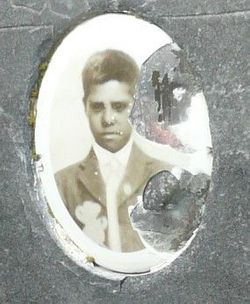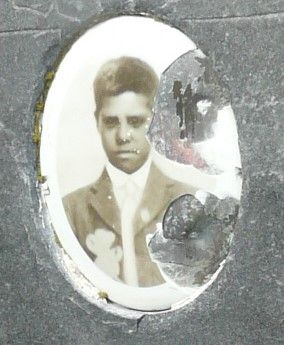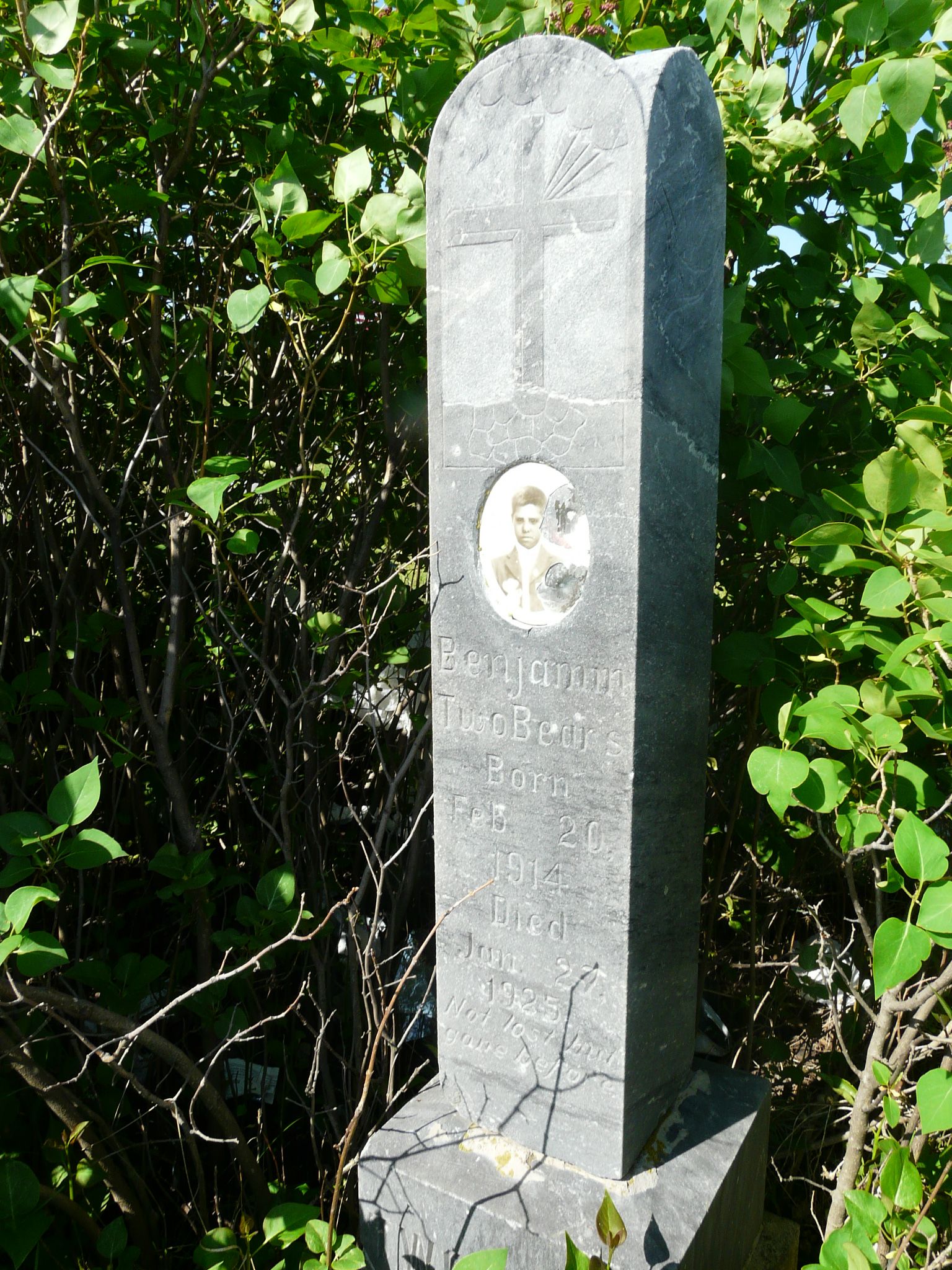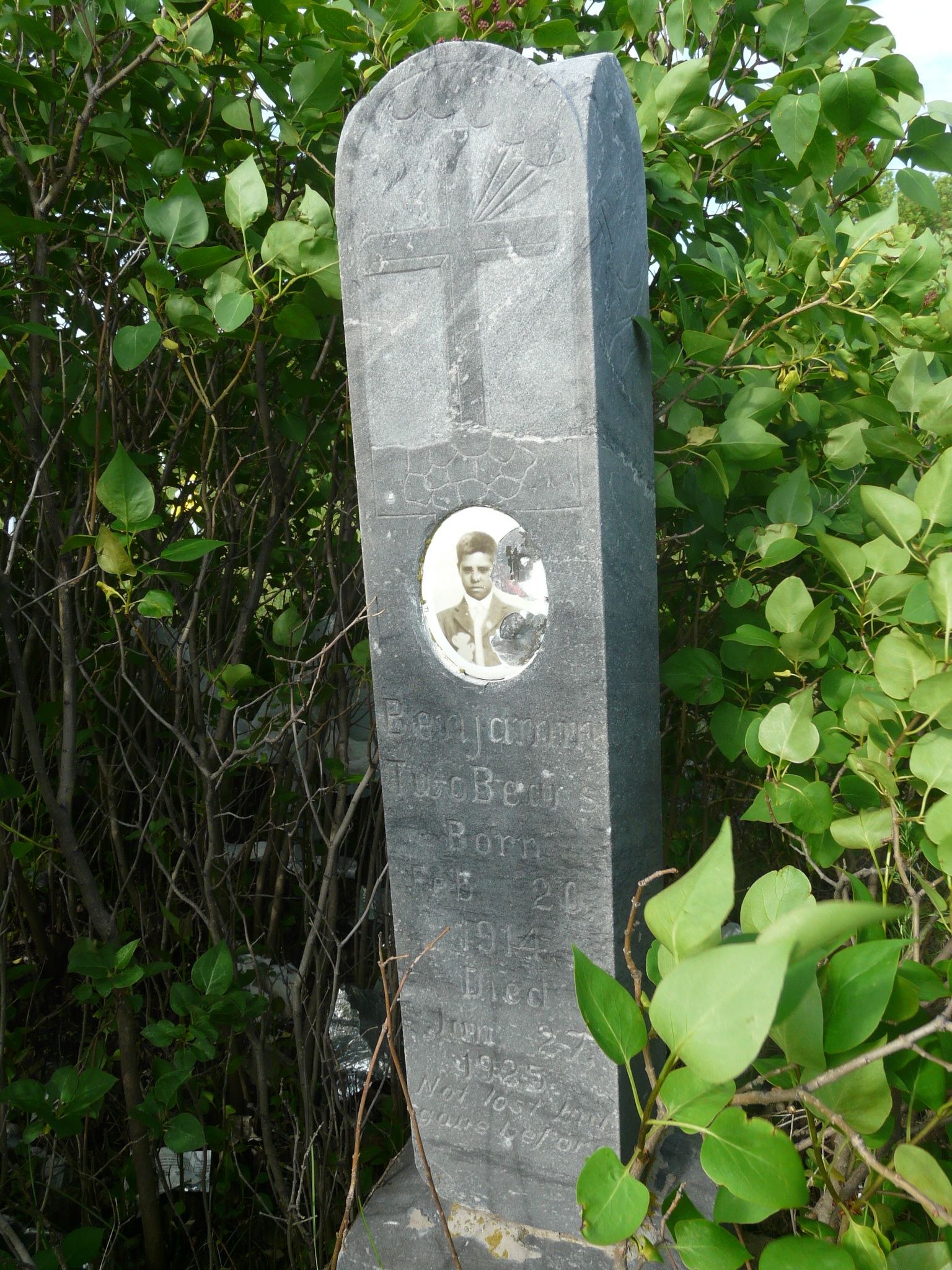THE STORY OF BENNY, THE SON OF TWO BEARS
Little Benny was an Indian boy. His father was the grandson of the famous Sioux Chief named Two Bears, who led General Sully such merry chases around, over the prairies of North Dakota in the 1860's.
When the old Chief Two Bears passed over the grey hills and into the valleys where the 'Ghostly Campfires' gleam, and after Sully had made history by writing his self-bestowing praise of the manner in which he had forced the great warrior and his clouted men to run so rapidly into the red and yellow wildernesses of the farthest Bad Lands of the unknown regions of the Little Missouri river – after the grass had grown tall and luxurious at certain numerous, scattered clumps in too many well-nourished spots upon the slopes of the Little Big Horn; and the timid antelope had ventured to return to the valley of the stream where a thousand Dakotah fires had gleamed in 1876; after the Great Father, who lived in the big white house in Washington and represented a munificent and benevolent (pronounced 'malevolent' by the Sioux) government, had presented many iron plows and very slow and untrained oxen to the Sioux, by virtue of a nicely-written inscription engraved upon strong-white paper with a splendid picture of an eagle at the top and a lot of red ribbons dangled from the lower left hand corner; and shiny, parallel lines of steel led out across the Minnishoshe and reached into the brilliant west – it was then that the dignified Chief Two Bears, wrapped his tattered buffalo robe about him and, unafraid, lifted the flap and entered the lodge where dwelt the Wakantonka of the Dakotah's.
When Two Bears was to be seen no more among the living of his people, Ista Maza (Iron Eyes) the grandson, who had been christened 'Basil,' attended an Indian dance between two high hills just south of the mouth of the Iyan Wkan Gapi Wakpe (Cannon Ball river) and received the name of his warrior grandfather.
In the course of natural events the new Two Bears, baptized Basil, took a wife, whose father had been a white man, from the lodges of the Yanktonaise. This woman brought a boy named Hehaka Mani (Walking Elk) whose father, Pezhi, was the son of the Sihasapa Chief Mato Watakpe (Charging Bear), to the new lodge fire of Two Bears, baptized Basil.
Then, after a while, Benny came to brighten the lodge of Two Bears and his woman and, at last, Hehaka Mani went across the ocean to Soissons and died there in the open field amid the flying steel, with the war cry of the Sioux upon his lips, as befitting a grandson of the Sihasapa Chief, Mato Watakpe, sometimes called Grass.
And little Benny, with fearless, unflinching eyes, watched a Major of Field Artillery (a friend of his mother, the Yanktonaise woman, the woman of Two Bears) in an army uniform point to a dotted line where she signed her name receipting for the returned body of Hehaka Mani, wrapped in a rotted army overcoat with mud upon it, and sealed in an olive-drab steel casket, and he saw that imposing steel casket lowered into a hole in a pitiful Indian graveyard, upon the gloriously sunny slopes of 'The Holy Hill,' upon the Standing Rock Reservation.
Albert Grass, grandson of Chief John Grass
Welch brought his body back from France, 1918
biog331-albert-grass-photo
And he saw his mother, the woman of Two Bears, baptized Basil, hack off her hair and slash her arms with a knife in grief, and he listened to the weird savage wails of the Sioux as they chanted the Death Song for a dead, fighting man of the people, and an old warrior laid an eagle's feather bonnet upon the grave; and the people ate up the six cattle at the feast, and the Government paid the mother One Hundred Dollars ($100.00) and wrote 'Killed in Action' after the name of Hehaka Mani, the soldier called Albert Grass, grandson of the Sihasapa Chief called Chief John Grass by the white-skinned settlers who came in after old Two Bears had seen the strong, white paper and the red ribbons, where it said that the Sioux would have plows and school teachers, sometime.
Mrs. Two Bears
Mother of Albert Grass
biog332-mrs-two-bears-photo
And now Benny, the son of Two Bears, baptized Basil, and his woman who also bore the soldier Hehaka Mani, who lies in Mother Earth upon the slopes of Holy Hill, upon the Standing Rock, is dead.
He was a little fellow, but "Bright," the agent said, "considering the fact that he is nothing but an Indian." He had the soothing manner of some Indian Agents and always said the correct thing at the right time, did this Agent.
Little Benny had the same upright bearing that Hehaka Mani had had and there was a fearless way about him, for behind his steady eyes lived the soul of a great warrior Chief, that of Two Bears, who went into the wild, red and yellow canyons of the Bad Lands along the Little Missouri, when he desired rest and peace.
"My mother," he said, to the woman of Two Bears, baptized Basil, "Please wash my body now and take my best clothes from the painted par-flesche box. I am going to die pretty soon now and I want you to put my best clothes upon me, after I am very clean. Then place me close by Hehaka Mani, the Soldier."
And the gentle hands of the Indian mother lovingly performed the service, and tears of sorrow, but pride, fell upon the wasted body of Little Benny, who had brightened the lodge of the father, who was the grandson of Chief Two Bears of the Sioux. Then the "Black Robe" came with his oils and water and anointed the little Indian boy Benny, and administered the ceremonies of Holy Church.
"I will sit over by the fire where it is warm," said Little Benny, and sitting there in the dark, he watched the colors come and go in the live ashes of the wood fire, but he did not tell what visions he saw there. Perhaps they brought thoughts of his great ancestor, the brave Two Bears, who saw Wakantonka in the sunset. Maybe he drew pictures of the soldier, Albert Grass, of the records of the First Division, A.E.F., and of his brave passing in the trampled, bloody what field at Soissons, south of the Chemin de Dames. Were he old enough to know the searing sorrows of his people who had been free in times remote, and would be now if Tunkasila, who dwells in the big white house at Washington, had but time to think of them, he would have thought of those things, too.
But his eyes became very bright as he sat there before the fire of wood and watched the opalline changes, and the spirit of Two Bears, who smoked a red-stone pipe when he prayed, and reverently blew the fragrant white cloud of smoke toward Wakantonka, as a sacrifice, stood by his side and said, "Come, my grandchild."
"Papa," he said to Two Bears, baptized Basil, "come and hold me in your arms. I am going to leave you, now. Do not forget, Papa, I want – to be – close by – Hehaka Mani. I am – going now."
They buried Benny in the little, pitiful, Indian graveyard, which is splashed with sunshine in the summer time, upon the slopes of 'The Holy Hill,' facing the Minnishoshe, where the first rays of the rising sun touch, with fingers of golden light, the faded flag which whips in the prairie winds about the mound beneath which lies the torn body of the soldier of the First Division, A.E.F., Albert Grass – Hehaka Mani of the Sioux and grandson of the Sihasapa Chief Mato Watakpe, sometimes called Grass. And Two Bears and his woman of the gentle hands and pitiful grief, walked slowly through the winter's early gloom, back to the lodge – and an old Indian woman of the happy buffalo days, stood apart and chanted a warriors song in a minor key, of the bravery of Two Bears who worshipped in the red and yellow Bad Lands, and of Hehaka Mani who struck the enemy – and of Little Benny, who looked with fearless eyes at the pictures which he saw in the changing colors of the wood fires in the lodge of Two Bears, baptized Basil, grandson of Two Bears of the Sioux.
Benny Two Bears died January 27, 1925 at Cannon Ball, N.D.
Updated by Misty Heiden
THE STORY OF BENNY, THE SON OF TWO BEARS
Little Benny was an Indian boy. His father was the grandson of the famous Sioux Chief named Two Bears, who led General Sully such merry chases around, over the prairies of North Dakota in the 1860's.
When the old Chief Two Bears passed over the grey hills and into the valleys where the 'Ghostly Campfires' gleam, and after Sully had made history by writing his self-bestowing praise of the manner in which he had forced the great warrior and his clouted men to run so rapidly into the red and yellow wildernesses of the farthest Bad Lands of the unknown regions of the Little Missouri river – after the grass had grown tall and luxurious at certain numerous, scattered clumps in too many well-nourished spots upon the slopes of the Little Big Horn; and the timid antelope had ventured to return to the valley of the stream where a thousand Dakotah fires had gleamed in 1876; after the Great Father, who lived in the big white house in Washington and represented a munificent and benevolent (pronounced 'malevolent' by the Sioux) government, had presented many iron plows and very slow and untrained oxen to the Sioux, by virtue of a nicely-written inscription engraved upon strong-white paper with a splendid picture of an eagle at the top and a lot of red ribbons dangled from the lower left hand corner; and shiny, parallel lines of steel led out across the Minnishoshe and reached into the brilliant west – it was then that the dignified Chief Two Bears, wrapped his tattered buffalo robe about him and, unafraid, lifted the flap and entered the lodge where dwelt the Wakantonka of the Dakotah's.
When Two Bears was to be seen no more among the living of his people, Ista Maza (Iron Eyes) the grandson, who had been christened 'Basil,' attended an Indian dance between two high hills just south of the mouth of the Iyan Wkan Gapi Wakpe (Cannon Ball river) and received the name of his warrior grandfather.
In the course of natural events the new Two Bears, baptized Basil, took a wife, whose father had been a white man, from the lodges of the Yanktonaise. This woman brought a boy named Hehaka Mani (Walking Elk) whose father, Pezhi, was the son of the Sihasapa Chief Mato Watakpe (Charging Bear), to the new lodge fire of Two Bears, baptized Basil.
Then, after a while, Benny came to brighten the lodge of Two Bears and his woman and, at last, Hehaka Mani went across the ocean to Soissons and died there in the open field amid the flying steel, with the war cry of the Sioux upon his lips, as befitting a grandson of the Sihasapa Chief, Mato Watakpe, sometimes called Grass.
And little Benny, with fearless, unflinching eyes, watched a Major of Field Artillery (a friend of his mother, the Yanktonaise woman, the woman of Two Bears) in an army uniform point to a dotted line where she signed her name receipting for the returned body of Hehaka Mani, wrapped in a rotted army overcoat with mud upon it, and sealed in an olive-drab steel casket, and he saw that imposing steel casket lowered into a hole in a pitiful Indian graveyard, upon the gloriously sunny slopes of 'The Holy Hill,' upon the Standing Rock Reservation.
Albert Grass, grandson of Chief John Grass
Welch brought his body back from France, 1918
biog331-albert-grass-photo
And he saw his mother, the woman of Two Bears, baptized Basil, hack off her hair and slash her arms with a knife in grief, and he listened to the weird savage wails of the Sioux as they chanted the Death Song for a dead, fighting man of the people, and an old warrior laid an eagle's feather bonnet upon the grave; and the people ate up the six cattle at the feast, and the Government paid the mother One Hundred Dollars ($100.00) and wrote 'Killed in Action' after the name of Hehaka Mani, the soldier called Albert Grass, grandson of the Sihasapa Chief called Chief John Grass by the white-skinned settlers who came in after old Two Bears had seen the strong, white paper and the red ribbons, where it said that the Sioux would have plows and school teachers, sometime.
Mrs. Two Bears
Mother of Albert Grass
biog332-mrs-two-bears-photo
And now Benny, the son of Two Bears, baptized Basil, and his woman who also bore the soldier Hehaka Mani, who lies in Mother Earth upon the slopes of Holy Hill, upon the Standing Rock, is dead.
He was a little fellow, but "Bright," the agent said, "considering the fact that he is nothing but an Indian." He had the soothing manner of some Indian Agents and always said the correct thing at the right time, did this Agent.
Little Benny had the same upright bearing that Hehaka Mani had had and there was a fearless way about him, for behind his steady eyes lived the soul of a great warrior Chief, that of Two Bears, who went into the wild, red and yellow canyons of the Bad Lands along the Little Missouri, when he desired rest and peace.
"My mother," he said, to the woman of Two Bears, baptized Basil, "Please wash my body now and take my best clothes from the painted par-flesche box. I am going to die pretty soon now and I want you to put my best clothes upon me, after I am very clean. Then place me close by Hehaka Mani, the Soldier."
And the gentle hands of the Indian mother lovingly performed the service, and tears of sorrow, but pride, fell upon the wasted body of Little Benny, who had brightened the lodge of the father, who was the grandson of Chief Two Bears of the Sioux. Then the "Black Robe" came with his oils and water and anointed the little Indian boy Benny, and administered the ceremonies of Holy Church.
"I will sit over by the fire where it is warm," said Little Benny, and sitting there in the dark, he watched the colors come and go in the live ashes of the wood fire, but he did not tell what visions he saw there. Perhaps they brought thoughts of his great ancestor, the brave Two Bears, who saw Wakantonka in the sunset. Maybe he drew pictures of the soldier, Albert Grass, of the records of the First Division, A.E.F., and of his brave passing in the trampled, bloody what field at Soissons, south of the Chemin de Dames. Were he old enough to know the searing sorrows of his people who had been free in times remote, and would be now if Tunkasila, who dwells in the big white house at Washington, had but time to think of them, he would have thought of those things, too.
But his eyes became very bright as he sat there before the fire of wood and watched the opalline changes, and the spirit of Two Bears, who smoked a red-stone pipe when he prayed, and reverently blew the fragrant white cloud of smoke toward Wakantonka, as a sacrifice, stood by his side and said, "Come, my grandchild."
"Papa," he said to Two Bears, baptized Basil, "come and hold me in your arms. I am going to leave you, now. Do not forget, Papa, I want – to be – close by – Hehaka Mani. I am – going now."
They buried Benny in the little, pitiful, Indian graveyard, which is splashed with sunshine in the summer time, upon the slopes of 'The Holy Hill,' facing the Minnishoshe, where the first rays of the rising sun touch, with fingers of golden light, the faded flag which whips in the prairie winds about the mound beneath which lies the torn body of the soldier of the First Division, A.E.F., Albert Grass – Hehaka Mani of the Sioux and grandson of the Sihasapa Chief Mato Watakpe, sometimes called Grass. And Two Bears and his woman of the gentle hands and pitiful grief, walked slowly through the winter's early gloom, back to the lodge – and an old Indian woman of the happy buffalo days, stood apart and chanted a warriors song in a minor key, of the bravery of Two Bears who worshipped in the red and yellow Bad Lands, and of Hehaka Mani who struck the enemy – and of Little Benny, who looked with fearless eyes at the pictures which he saw in the changing colors of the wood fires in the lodge of Two Bears, baptized Basil, grandson of Two Bears of the Sioux.
Benny Two Bears died January 27, 1925 at Cannon Ball, N.D.
Updated by Misty Heiden
Family Members
Sponsored by Ancestry
Advertisement
Records on Ancestry
Advertisement













